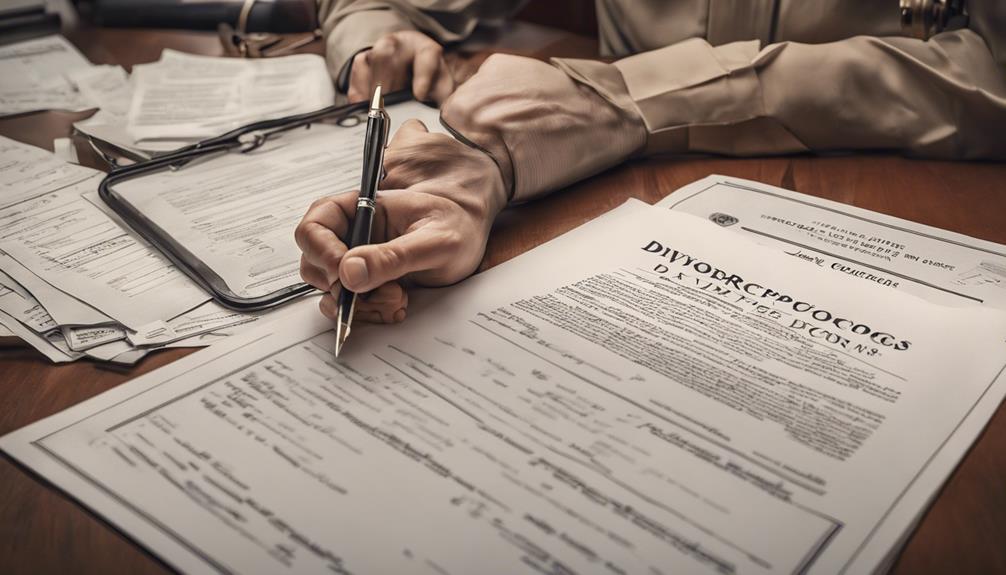As we begin the challenging process of divorce in Maryland, we are about to embark on a significant journey. Understanding the intricate legal requirements and crucial steps can be daunting yet crucial.
Let's explore the initial steps in this process, shedding light on the essential considerations and decisions that pave the way for a smoother path ahead.
Key Takeaways
- Meet Maryland residency requirements for divorce jurisdiction.
- Understand fault vs. no-fault grounds for divorce.
- Differentiate between contested and uncontested divorce processes.
- Seek legal guidance for responding to divorce complaints and finalizing the process accurately.
Residency and Jurisdiction Requirements
In order to initiate the divorce process in Maryland, one of the parties involved must meet the residency requirements specified by the state law. The residency requirements for filing for divorce in Maryland are crucial as they determine the jurisdiction of the court over the case.
If the grounds for divorce occurred within Maryland, the party filing for divorce must be a current resident of the state. On the other hand, if the grounds for divorce happened outside of Maryland, the filing party needs to have resided in the state for at least six months before filing. These specific residency details can be found in Md. Code, Family Law § 7-101, providing clarity on the necessary duration of residency based on where the grounds for divorce originated.
Understanding and meeting these residency requirements are essential steps in the divorce process to ensure that the court has the proper jurisdiction to handle the case effectively and efficiently.
Choose Your Grounds for Divorce

When deciding on the grounds for divorce in Maryland, it's crucial to choose valid reasons that align with your situation.
We must understand the residency requirements and how they intersect with the chosen grounds.
Additionally, considering the differences between fault and no-fault divorces can impact the process significantly.
Select Valid Grounds
When proceeding with a divorce in Maryland, selecting the appropriate grounds is a critical decision that sets the foundation for the divorce process. The 6-month separation ground necessitates living apart continuously for half a year before filing for divorce.
Irreconcilable differences indicate substantial conflicts that have led to the breakdown of the marriage. Mutual consent involves both parties agreeing and signing a written settlement without objections.
Understanding these options and choosing the most suitable ground is essential for initiating the divorce process in Maryland. Each of these grounds has its requirements and implications, so careful consideration based on your circumstances is vital to ensure a smoother divorce process.
Understand Residency Requirements
Understanding the residency requirements for filing for divorce in Maryland is a crucial step in determining the grounds for your divorce. In Maryland, at least one party must be a resident to file for divorce, with the length of residency varying based on where the grounds for divorce occurred. Grounds within Maryland require current residency, while grounds outside Maryland necessitate six months' residency. Specific residency requirements are outlined in Md. Code, Family Law § 7-101. Meeting these requirements is vital to ensure a successful divorce process. Below is a table summarizing the residency requirements for filing for divorce in Maryland:
| Grounds within Maryland | Grounds outside Maryland |
|---|---|
| Require current residency | Need six months' residency |
Consider Fault Vs. No-Fault
Considering fault versus no-fault grounds is a critical decision when choosing how to proceed with your divorce in Maryland. Maryland allows for a range of grounds for divorce, including fault-based reasons like adultery, desertion, and cruelty, as well as no-fault grounds such as a 6-month separation, irreconcilable differences, and mutual consent.
Understanding the implications of these options is essential for navigating the divorce process effectively. Opting for a no-fault divorce may result in a quicker and less contentious resolution. Choosing the appropriate grounds for divorce establishes the legal basis for the entire proceedings in Maryland.
For more detailed information on fault vs. no-fault grounds for divorce, consider consulting resources like the Maryland Court Help Center.
Decide on Contested or Uncontested Divorce

To make an informed decision about whether to pursue a contested or uncontested divorce in Maryland, it's essential for both spouses to carefully assess their level of cooperation and agreement on key issues.
- Uncontested Divorce:
- In this scenario, both spouses are in agreement on important matters like alimony, property division, and child custody.
- Contested Divorce:
- A contested divorce arises when spouses can't come to an agreement on one or more crucial issues, necessitating court intervention.
- Considerations:
- The choice between contested and uncontested divorce hinges on the level of cooperation and harmony between spouses.
Choosing the type of divorce that best suits your situation is crucial. Uncontested divorces tend to be faster, more cost-effective, and less acrimonious, while contested divorces can lead to court hearings, trials, and increased complexity. Understanding your level of agreement and cooperation can help streamline the divorce process and lead to a more amicable resolution.
Obtain and Prepare Necessary Forms

To ensure a smooth divorce process in Maryland, the first step is to acquire and fill out the necessary forms accurately. You will need essential documents such as the Complaint for Absolute Divorce (Dom.Rel. 20) and the Civil Domestic Information Report. It is crucial to complete all required paperwork truthfully and in adherence to Maryland's divorce laws. Additionally, consider attaching supplementary forms like the Marital Settlement Agreement, Financial Statement, and Child Support Guidelines Worksheet if they apply to your situation. Review the instructions accompanying each form meticulously to ensure accurate completion. Seek assistance from legal resources or professionals if you encounter any uncertainties during the form-filling process.
| Required Forms | Additional Documents |
|---|---|
| Complaint for Absolute Divorce (Dom.Rel. 20) | Marital Settlement Agreement |
| Civil Domestic Information Report | Financial Statement |
| Child Support Guidelines Worksheet |
File and Serve Divorce Papers

After obtaining and preparing the necessary divorce forms in Maryland, the next crucial step is to proceed with filing and serving the divorce papers accurately to officially initiate the legal process. Filing and serving divorce papers are essential steps in the divorce process that require attention to detail and adherence to specific procedures.
Here are three key points to consider when filing and serving divorce papers in Maryland:
- Choose the Correct Method: Ensure you select an appropriate method for serving the divorce papers, such as Certified Mail, Sheriff, or Private Process Server. Each method has specific requirements and procedures that must be followed for proper service.
- Complete the Filing Process: Submit the completed divorce forms, including the Complaint for Absolute Divorce and any related financial and property forms, to the appropriate court for filing. This step officially initiates the legal process of divorce in Maryland.
- Confirm Proper Service: Once the divorce papers are filed, verify that they've been correctly served to your spouse. Proper service ensures that your spouse is officially notified of the divorce proceedings, moving the process forward smoothly.
Respond to Divorce Complaint

Upon receiving a divorce complaint, our immediate priority is to respond promptly by filing an Answer within the designated timeframe. It's crucial to address the claims made in the complaint thoroughly. If there are additional issues that need to be raised, such as counterclaims, they should be included in the response. Failure to respond within the specified time may lead to a default judgment being entered against us, which could have serious consequences. Adhering to court deadlines and procedures is essential during this phase of the divorce process.
Seeking legal advice or assistance can greatly benefit us in ensuring that our response is accurate and submitted on time. An attorney can offer guidance on the best way to structure our Answer and can help navigate any complexities that may arise. By being proactive and seeking the necessary help, we can effectively respond to the divorce complaint and protect our rights throughout the legal proceedings.
Finalize the Divorce Process

Once all court hearings have been attended and any outstanding issues addressed, it's crucial to obtain the final divorce decree from the court.
Updating legal documents like wills and insurance policies is necessary to reflect the new marital status.
Seek guidance from resources like Maryland's Family Court Help Centers for assistance in finalizing the divorce process smoothly.
Court Approval Required
To complete the divorce process in Maryland, we must seek court approval, a crucial step that ensures the legal dissolution of the marriage. The court carefully reviews all aspects of the divorce agreement before granting approval, guaranteeing that both parties' rights and responsibilities are considered.
Finalizing the divorce involves obtaining a final divorce decree from the court, which officially declares the end of the marital union. This court-approved decree serves as a vital document, outlining the terms of the divorce settlement and confirming the legal dissolution of the marriage. It's essential to follow the court's procedures meticulously to successfully navigate this phase of the divorce process.
- Court approval is essential for finalizing the divorce.
- The court reviews the divorce agreement before granting approval.
- Obtaining a final divorce decree confirms the legal end of the marriage.
Sign Legal Documents
When signing legal documents to finalize the divorce process, it's crucial for both parties to ensure that all required agreements and disclosures are signed and acknowledged. This step is essential to officially end the marriage. Seek guidance from the Family Court Help Center or consult with a legal advisor to ensure that all documents are correctly filled out and signed.
Make sure both spouses sign any necessary settlement agreements or parenting plans, as well as acknowledge any financial disclosures or property division agreements. If the court requires witness signatures, ensure that these are obtained.
Lastly, file all signed documents with the court promptly to complete the divorce process officially. Remember, seeking legal advice can help navigate this part of the divorce process smoothly.
Obtain Divorce Decree
Securing the divorce decree is a crucial step in finalizing the divorce process in Maryland, as it formally concludes the legal dissolution of the marriage. When obtaining the divorce decree, it's essential to address key aspects such as child custody, property division, and compliance with the court order. Here are three important considerations during this final stage:
- Court Order: The divorce decree is a binding court order that outlines the terms of the divorce settlement.
- Child Custody: It specifies custody arrangements, visitation schedules, and any child support obligations.
- Property Division: The decree details how assets and debts are divided between the parties, ensuring a fair distribution.
Obtaining this document marks the official end of the divorce process and sets the path for post-divorce arrangements.
Frequently Asked Questions
How Long Do You Have to Be Separated in Maryland to Get a Divorce?
We must be separated for a continuous 6 months in Maryland to qualify for a divorce. Living apart, even in the same home, satisfies the requirement. Proof of this separation for 6 months is crucial for a divorce decree.
What Is the Fastest Way to Get a Divorce in Maryland?
The quickest way to get a divorce in Maryland is through mutual consent. By both spouses signing a settlement agreement, the process can be expedited, bypassing the usual 12-month separation requirement. This option typically finalizes in about 60 days.
How Much Does It Cost to File for a Divorce in the State of Maryland?
It costs approximately $165 to file for a divorce in Maryland, covering court fees. Additional expenses from $10 to $70 may apply for serving divorce papers. Eligibility for fee waivers is based on income. Legal fees vary depending on case complexity and attorney rates.
What Are Grounds for Immediate Divorce in Maryland?
We can seek an immediate divorce in Maryland based on mutual consent, irreconcilable differences, or a 6-month separation. Mutual consent allows swift divorce without a waiting period if both agree, while irreconcilable differences don't need proof of fault.
What Are the Additional Steps Needed to Get a Divorce in Maryland?
The Maryland divorce process steps include filing a complaint for divorce, serving the other party, attending a scheduling conference, and participating in alternative dispute resolution. If an agreement can’t be reached, the case will go to trial. After the trial, the court will issue a divorce decree, officially ending the marriage.
Conclusion
As we navigate the complex process of divorce in Maryland, it can feel like we're in a turbulent storm at sea.
But just like a lighthouse guides ships safely to shore, legal assistance and local resources can help us navigate the choppy waters of divorce with clarity and ease.
Remember, even though the journey may be challenging, there's always a guiding light to help us reach a peaceful resolution in the end.










